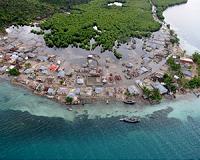 |
Santo Domingo (AFP) Nov 17, 2010 The Dominican Republic struggled Wednesday to slow the advance of a raging cholera epidemic from neighboring Haiti Wednesday, after discovering the first case of the highly contagious disease within its borders. President Leonel Fernandez held an emergency strategy meeting with his cabinet to discuss ways to combat the disease, a day after health officials diagnosed a 32-year-old Haitian-born man with cholera in the Dominican Republic. "The decision was made to tighten health controls along the border," health minister Bautista Rojas Gomez hold reporters during a break in the cabinet meeting. "With respect to water, there will be stricter oversight, including chlorination throughout the country." Local media said the government would also bar Haitians from working in the construction and tourism sectors. The measures by the Dominican government are meant to prevent a cholera outbreak like the one spreading rapidly in its next-door neighbor across the porous, 376-kilometer (234-mile) border. Rojas Gomez noted that the single confirmed cholera patient had contracted the disease in Haiti, not the Dominican Republic, and stepped straight off a bus from Port-au-Prince to get treatment in a hospital. If Dominicans follow hygienic measures, drink only potable water and eat cooked foods while border controls remain, there will be "no problem," he said. Officials in the Dominican Republic, which shares the island of Hispaniola with Haiti, also have conducted home searches to find cases of the highly contagious ailment. Rojas Gomez said there have 12 suspected cases of cholera so far in the Dominican Republic, with 11 of them testing negative. Yet local media reported other infections that have not yet been officially confirmed. Meanwhile, about 200 Haitian migrants suspected of trying to get across the border without proper documentation were arrested on their way to the northern city of Santiago as the Dominican Republic stepped up its border checks. The government has also dispersed more information to further encourage people to take the necessary hygiene measures, restricted street vending, limited trade with Haiti and conducted medical examinations of food vendors. Rojas Gomez also noted that a million leaflets had been ordered printed in the Creole dialect spoken in Haiti to be delivered on the Haitian side of the border. Dominican officials worry that the fear of the scourge could have a devastating impact on its tourist industry, the country's main income generator. "This really is a serious danger," Santos Ramirez of the Dominican Medical Board warned. "Cholera could become a pandemic if it spreads on this side of the island. We must avoid a disaster of that scope." Authorities fear the cholera epidemic could spread like wildfire if it takes hold in the squalid refugee camps around Haiti's capital, where hundreds of thousands of earthquake refugees live in cramped and unsanitary conditions, and could jump the border into the Dominican Republic. But cholera is a disease linked to poverty and lack of hygiene, and the Dominican government is equipped with the necessary medical facilities and is in the midst of a major prevention campaign that shields it, Rojas Gomez said. Haitian health officials said Wednesday that some 1,100 people have died since the disease was first detected in late October and more than 18,000 have been hospitalized. The cholera outbreak -- the first in half a century in the impoverished Caribbean nation -- is bringing new chaos to Haiti ravaged in a January quake, which killed 250,000 people and left 1.3 million homeless.
Share This Article With Planet Earth
Related Links Epidemics on Earth - Bird Flu, HIV/AIDS, Ebola
 Cholera could kill 10,000 in Haiti in the next year: expert
Cholera could kill 10,000 in Haiti in the next year: expertWashington (AFP) Nov 17, 2010 The cholera epidemic in Haiti could kill 10,000 people and cause 200,000 infections in the coming year, a doctor with the Pan-American Health Organization said on Wednesday. "Our projections show that we could have around 200,000 cases of infection in Haiti over the next six to twelve months," PAHO regional advisor Ciro Ugarte told AFP. "If the fatality rate (of four to five percent) is ... read more |
|
| The content herein, unless otherwise known to be public domain, are Copyright 1995-2010 - SpaceDaily. AFP and UPI Wire Stories are copyright Agence France-Presse and United Press International. ESA Portal Reports are copyright European Space Agency. All NASA sourced material is public domain. Additional copyrights may apply in whole or part to other bona fide parties. Advertising does not imply endorsement,agreement or approval of any opinions, statements or information provided by SpaceDaily on any Web page published or hosted by SpaceDaily. Privacy Statement |